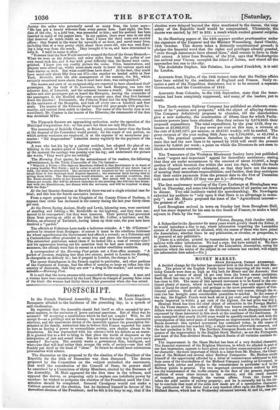POSTSCRIPT.
SATURDAY.
In the French National Assembly, on Thursday, M. Louis Napoleon Bonaparte alluded to the incidents of the preceding day, in a speech of self-vindication.
He regretted that the Assembly should find itself so often occupied by per- sonal matters, to the exclusion of grave national questions. But of what was he accused ? Of accepting a candidature which he had not sought ! Well, be did accept it—as a privilege and an honour; he accepted it because three successive elections, and the unanimous decree of the Assembly against the proscription ful- minated at his family, authorized him to believe that France regarded the name he bore as having a power to reconsolidate society, now shaken almost to its foundation. Ile was reproached with his silence—with his defects as an orator. It is granted but to a few to bring to that place the words of eloquence as the interpreters of just and sound ideas. But are words the only way to serve one's country ? No—acts. The country wants a government firm, intelligent, and vise—one that will heal rather than avenge the evils of society—one that will frankly put itself at the head of "ideas." In future he should meet calumnious provocatives with silence.
The discussion on the proposal to fix the election of the President of the Republic for the 10th of December was then discussed. The decree proposed by the Committee on the subject embodied the enactment, that until the constitution of the Council of State, its powers shall be exercised by a Committee of thirty Members, elected by the Bureaux of the Assembly. M. Mold appeared for the first time in the tribune, and opposed the decree, as proposing only to replace one indefinite power by another: he wished to postpone the election of the President until the Con- stitution should be completed. General Cavaignac would not make a Cabinet question of the election, but he declared himself in favour of the immediate election of the President; and he felt it his duty to say, that if the
election were delayed beyond the time mentioned in the decree, the very safety of the Republic itself would be compromised. Ultimately, the decree was carried, by 587 to 232; a result which excited general surprise.


























 Previous page
Previous page